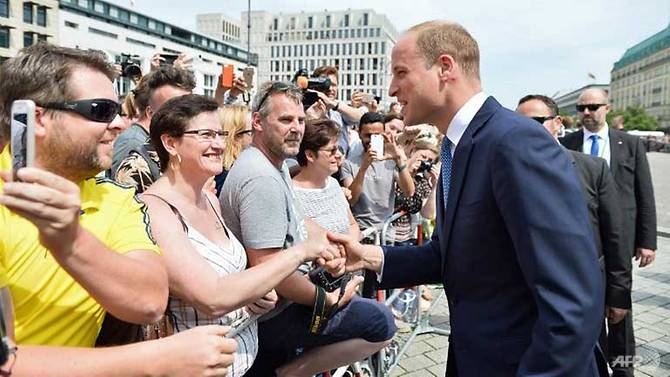William, Kate take Brexit 'charm offensive' to Germany
 |
| Britain's Prince William, Duke of Cambridge, talks with spectators as he visits Berlin's landmark Brandenburg Gate. (Gregor Fischer/POOL/AFP) |
BERLIN: Prince William and his wife Kate on Wednesday (Jul 19) began a three-day visit to Germany billed as a "charm offensive" by local media as Britain begins thorny Brexit talks in earnest.
Under brilliant summer sunshine, William, who is second in line to the British throne, and Kate touched down in Berlin from Poland accompanied by their young children George and Charlotte.
The first stop for the Duke and Duchess of Cambridge was a lunch of cod, tuna and salmon at the giant modern office complex of Chancellor Angela Merkel, widely considered the European Union's most powerful leader.
Merkel took the couple onto a balcony offering a sweeping view of the reunified city ahead of a meeting that was closed to reporters.
German media said the long-planned visit was auspiciously timed as the negotiations on Britain leaving the EU get under way in fits and starts.
At a speech at a garden party at the British embassy, Prince William said Germany and Britain "proudly share the same values as open and democratic societies and the same determination to champion those values and to defend them."
"This relationship between the United Kingdom and Germany really matters. It is the product of many years of working closely together. It will continue despite Britain's recent decision to leave the European Union," he said. "I am confident we shall remain the firmest of friends."
National broadsheet Sueddeutsche Zeitung called the young family "Her Majesty's Secret Weapon" and the German tour a "diplomatic mission" with the enthusiastic backing of the Foreign Office.
"They know better than anyone else on the island that the image of the United Kingdom on the continent is not the best at the moment," it said.
"What could you do in this situation to indicate to your neighbours that Britain is of course a stable nation? Obviously, you send in the royals."
"The royals represent a kind of common sense that this hard ideological government of the Tories seems to have completely lost at the moment," news website Spiegel Online said.
'RESCUE MISSION'
Conservative daily Die Welt called the royal visit to Germany "a kind of rescue mission" a year after the fateful Brexit referendum which stunned the remaining 27 EU member states.
"William and Kate are in Germany with their children to lighten the mood," it wrote.
In Poland, the royal couple met freedom icon and Nobel peace laureate Lech Walesa and visited a former Nazi German concentration camp.
The visit to Berlin was also steeped in history including a stop to greet cheering crowds at the Brandenburg Gate, the landmark symbol of German unity, and a viewing of the sprawling Holocaust Memorial in the heart of the capital.
William and Kate held a private meeting with Leon Henry Schwarzbaum, 96, who survived nearly two years at the Nazi death camp Auschwitz, and toured a museum at the memorial.
"It is very moving," William told reporters.
The pair then visited a charity caring for at-risk youth in the former communist eastern district of Marzahn before having afternoon tea with President Frank-Walter Steinmeier at his urban palace.
The couple will on Thursday move on to Heidelberg in the west, Cambridge's twin city, where they will take part in a rowing competition.
They return to Berlin late Thursday for a party at a century-old dance hall to meet Berliners working in "creative industries" before completing their European tour on Friday in the port city of Hamburg at the spectacular new Elbphilharmonie concert hall.
Britain played a major part in the institutional reconstruction of post-World War II West Germany, helping to craft the Federal Republic's constitution, known as the Basic Law, in 1949.
It also stationed armed forces in West Germany as part of the West's bulwark against the Soviet Union, and was one of the three western democracies, along with the United States and France, that supported West Berlin during the city's Cold War division.
In addition, the British royal family have long ancestral ties with Germany. The dynasty was a branch of the House of Saxe-Coburg-Gotha, but changed its name to the House of Windsor in 1917 because of anti-German sentiment in World War I Britain.
What the stars mean:
★ Poor ★ ★ Promising ★★★ Good ★★★★ Very good ★★★★★ Exceptional
Latest News
More News
- Russian President congratulates Vietnamese Party leader during phone talks (January 25, 2026 | 09:58)
- Worldwide congratulations underscore confidence in Vietnam’s 14th Party Congress (January 23, 2026 | 09:02)
- Political parties, organisations, int’l friends send congratulations to 14th National Party Congress (January 22, 2026 | 09:33)
- 14th National Party Congress: Japanese media highlight Vietnam’s growth targets (January 21, 2026 | 09:46)
- 14th National Party Congress: Driving force for Vietnam to continue renewal, innovation, breakthroughs (January 21, 2026 | 09:42)
- Vietnam remains spiritual support for progressive forces: Colombian party leader (January 21, 2026 | 08:00)
- Int'l media provides large coverage of 14th National Party Congress's first working day (January 20, 2026 | 09:09)
- Vietnamese firms win top honours at ASEAN Digital Awards (January 16, 2026 | 16:45)
- ASEAN Digital Ministers' Meeting opens in Hanoi (January 15, 2026 | 15:33)
- ASEAN economies move up the global chip value chain (December 09, 2025 | 13:32)
















 Mobile Version
Mobile Version